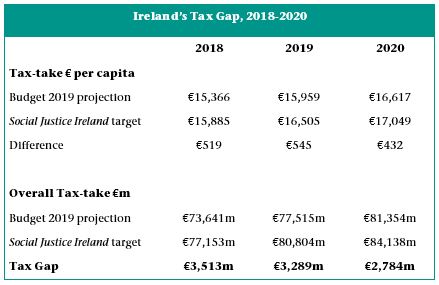Ireland needs an Adequate Tax-Take

Government's annual budget is the best opportunity available for policymakers to begin to tackle the various crises, challenges, and infrastructural deficits faced by Ireland. To achieve the various objectives, policy over the next few years must focus on increasing Ireland’s tax-take.
Previous benchmarks, set relative to the overall proportion of national income collected in taxation, have become redundant following recent revisions to Ireland’s GDP and GNP levels as a result of the tax-minimising operations of a small number of large multinational firms. Consequently, an alternative benchmark is required.
We propose a new tax take target set on a per-capita (or per-person) basis; an approach which minimises some of the distortionary effects that have emerged in recent years. Our target is calculated using CSO population data, ESRI population projections, and CSO and Department of Finance data on recent and future nominal overall taxation levels.
The target is that Ireland’s overall level of taxation should reach a level equivalent to €15,000 per capita in 2017 terms. This target should increase each year in line with growth in GNI*.
The table below compares our target to the projections of the Department of Finance as published in the documentation accompanying Budget 2019. We also calculate the overall tax gap for the economy; the difference between the level of taxation that is proposed to be collected and that which would be collected if the Social Justice Ireland target was achieved. In 2020 the overall tax gap is projected to be €2.78 billion and the average gap over the period 2018-2020 will be €3.2 billion per annum.
Increasing the overall tax take to this level would require a number of changes to the tax base and the current structure of the Irish taxation system. We outline some such changes for implementation in Budget Choices 2020, our budget submission, on pages 5-7. However, increasing overall taxation revenue to meet this new target would represent a small overall increase in taxation levels and one which is unlikely to have any significant negative impact on the economy. It would also not alter Ireland’s status as among the lowest taxed economies in Europe.
As a policy objective, Ireland can remain a low-tax economy, but it should not be incapable of adequately supporting the economic, social and infrastructural requirements necessary to support our society and complete our convergence with the rest of Europe.
